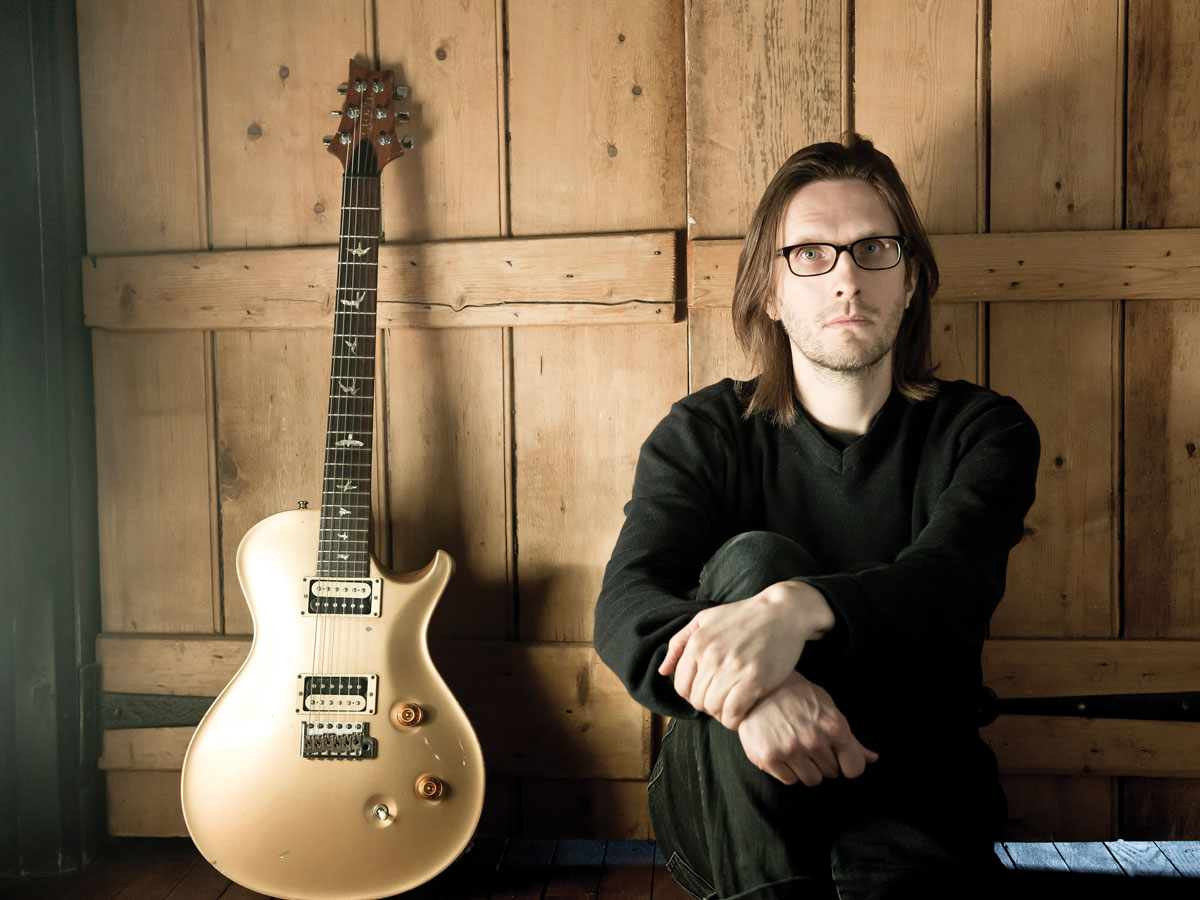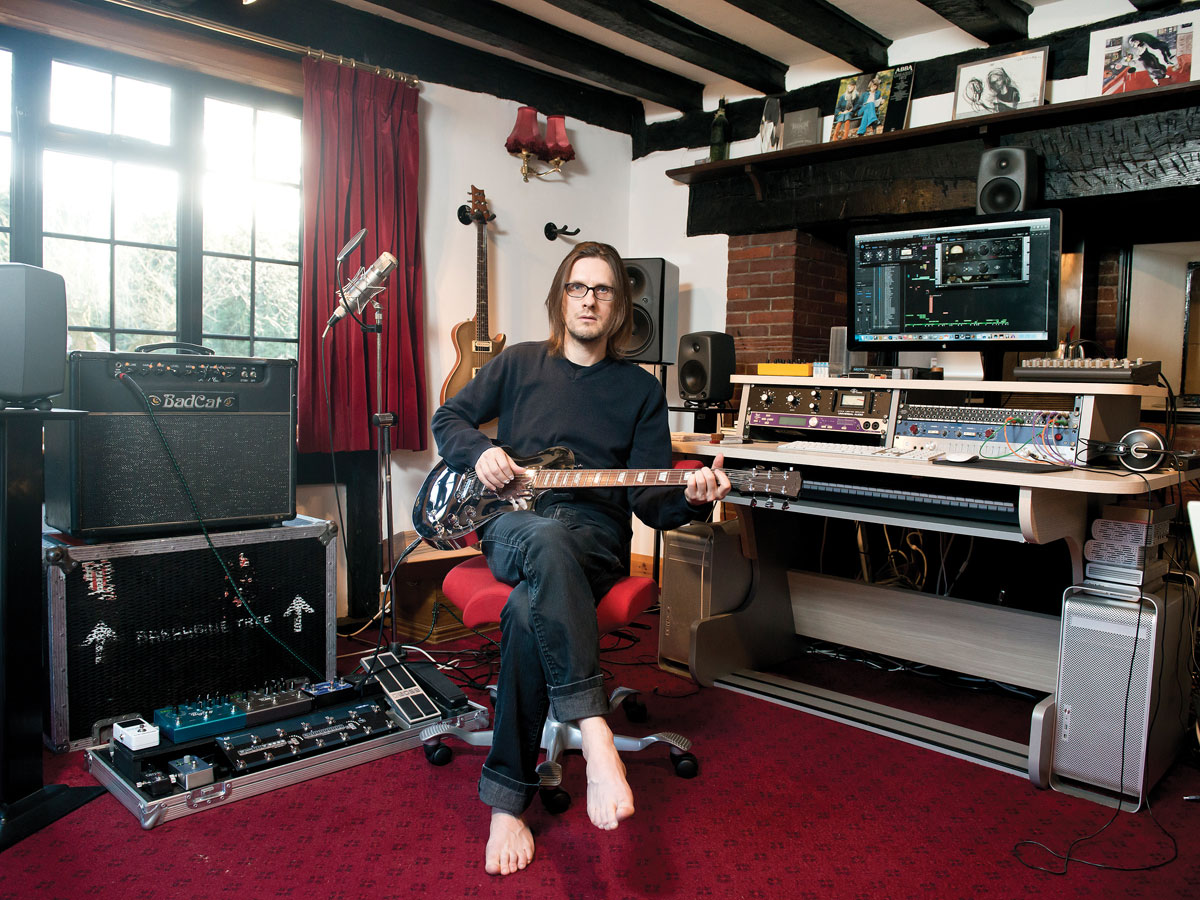Steven Wilson on taming Guthrie Govan and Hand. Cannot. Erase.
The genre-bending prog hero on his new album

Introduction
Steven Wilson's fourth solo album confirms him as the most fearless artist of our times. Here, he lets us in on his unique approach to production, songwriting, gear and taming the shred beast that is Guthrie Govan...
Don't call him a guitar hero. Steven Wilson is more like a creative tidal wave
Don't call him a guitar hero. Steven Wilson is more like a creative tidal wave. Breaking cover in the early 90s as the leader of the genre-blurring Porcupine Tree, and now forging an ambitious solo career, the 47-year-old is patently a man with more on his mind than the average rock pig.
He's a visionary, fusing topical and often-terrifying themes into concept albums that demand sequential listening in the age of the shuffled playlist. He's a virtuoso guitar player, but prefers to paint the bigger picture, producing all his own work, darting between an arsenal of instruments and dragging new technology to the outer reaches.
This year, Wilson returns with fourth release, Hand. Cannot. Erase. - an immersive album that takes the true story of a woman who lay dead in her London flat for three years as its jump-off point. Welcome to his world...

Establish the mood and the rest will follow
Some artists write riffs. For Wilson, it's all about creating atmosphere
"This album was inspired by Joyce Vincent. She died in her apartment in London, and it was three years before her body was discovered. Her story was at once fascinating, shocking and upsetting, and it became a symbol for me, of the way we're living in the city in the age of the internet.
"I'm not one of those guys who can just take a guitar into a room and come out with a song. I need all my instruments dotted around"
"Certain tones create certain moods. Certain pedals do, too. Sometimes, you get the sound and it immediately suggests the approach to playing. That's always been the way for me: find the right sound and the right notes naturally fall into place.
"I have my favourite chords, too, that I come back to time and again. I have a thing for major 7ths. They've got a very mournful, nostalgic quality to them. My favourite chord? Bb6th with added 9th."
Songwriting isn't just about the six-string
When it comes to composition, explains Wilson, guitar is not the only gear
"I'm not one of those guys who can just take a guitar into a room and come out with a song. I need all my instruments dotted around. Very often - even within the same song - I'll write one riff on the bass, the next riff on the guitar, then switch back to piano. Some of these tracks, they're long and complex. They have many different sections, move through different moods.
"Routine was written on piano, and you can hear that. But then you listen to Happy Returns, and you can tell it's definitely been written on guitar, with that singer-songwriter-y strumming quality.
"Then you go to Home Invasion, which starts off with a kind of death-metal riff that was obviously written on the guitar. There's one song called Perfect Life, where the starting point was electronic drums and loops."

Production is about the bigger picture
Wilson says the best thing he ever learned on guitar was to step back from it
"This album all comes from the idea of me being a producer, rather than a player. The analogy for me would be a film director: a producer is this guy who's in charge of the whole musical vision, and he'll do anything it takes to realise that.
"Guthrie is such a naturally gifted player. It's like there is no division between his brain and the guitar"
"I never saw myself as a guitar player. I saw myself as a writer and producer, playing whatever it took to create a finished piece. I'm as interested in sound design as I am in playing. I'm always thinking in terms of the overall picture and journey.
"I think what's changed my relationship with the guitar most was stepping back from the actual playing side and hiring other players like Guthrie Govan. That's a completely new perspective, and it's interesting how differently you think about the role of the guitar when you're freed from the actual responsibility of playing it, y'know?"
Too much technique is dangerous
Govan's chops are a weapon, says Wilson, but they need careful deployment
"Guthrie is such a naturally gifted player. It's like there is no division between his brain and the guitar. He is the guitar. Now, that had its own challenges on this record, because he's naturally inclined to do things which are impressive, but not necessarily right for the song. If you can get him in the right space, he's exquisite. For me, the thing was to get Guthrie into the right sound area, the right space, the right vibe.
"A lot of that was to do with the sound. If you give a guitar player a very clean tone, someone like Guthrie will play very fast. But if you give him a sound that's got more ambience and delay, naturally, they tend to slow down, because they have to work with the sound. So we fed Guthrie through Leslie cabinets, delays, reverbs, filters - and it's interesting how it made him play in a way that was more what I was looking for."

Plug-in and play
Computer-generated tones have always been a vital part of Wilson's palette
"There are times when playing with plug-ins can be inspirational. I use Universal Audio plug-ins, which have simulations of the old analogue stuff. I also record in Logic Audio for plug-ins, like the Logic tape delay. But one of my favourites - and I used this on almost every track - is the Universal Audio Ampex tape simulator.
"I'm not a big fan of chorus and flanging, but I do like some kind of subtle vibrato modulation"
"What you can do is put the signal through it to simulate tape wobble and flutter, which makes it sound like the instrument is rusting or decaying, like a faulty old reel-to-reel tape recorder.
"I love taking beautiful sounds and making them lo-fi. There are some great amp sims in Logic, too. I still use Amp Farm. Logic discontinued that: they've got Amp Designer now. But I actually prefer the old one, and you can still dial it up using the Legacy option."
Old school rules
Wilson might be a tech-head, but there's still room for amps and axes...
"I think there are some fantastic things about plugging a guitar directly into the software, and using the plug-ins and the amp simulators and tape delays - all this stuff is incredible. But at the same time, there is a place for doing it the vintage, classical way. Y'know, we have a lot of pedals, amps and guitars at our disposal. On this album, we used Guthrie's old ES-335 a lot, and I tend to use a PRS Custom 22 for most of my stuff.
"For most things, we used a 1986 Marshall 50-watt, standard lead, modified by Dave Friedman to be two channels of master volume - clean and gain channels - plus his Fat Brown Eye mod and an effects loop.
"Pedal-wise, we were using a Strymon TimeLine and BigSky, and we had the Diamond Vibrato pedal. I'm not a big fan of chorus and flanging, but I do like some kind of subtle vibrato modulation. And when I played a solo, I had a lower octave coming from the Micro POG."

Reverb rules
It's not the most exotic effect on the 'board, but Wilson says reverb is vital
"One thing I love about Amp Farm is the old spring reverb simulator. I used to use impulse response plug-ins, a lot of very expensive, cinematic-sounding reverbs. Now, I'm finding that I'm favouring old-school mono spring reverb-type things. I got more used to the idea of reverbs that have a very vintage character and personality.
"It's tempting to put beautiful-sounding reverbs on everything, but when you put it all together, you get this mush"
"It's tempting to put beautiful-sounding reverbs on everything, but when you put it all together, you get this mush. If you keep reverbs mono, and very old-school, suddenly that frees up more space in the mix, because there's a lot going on in these tracks sometimes. I also use the EMT 140, which is UA's plug-in that simulates the old 70s EMT plate reverb. They're more transparent, sit better in the mix and have more character."
Keep 'em guessing
Chances are, says Wilson, that piano part you're listening to is really a guitar
"When I first picked up a guitar, I wasn't interested in knowing how to play it. I was interested in learning how to make it create weird sounds. And I think that continues through to this day.
"Sometimes, there are keyboard sounds on this record that are actually guitars. Sometimes, rather than using a keyboard pad or a keyboard texture, you use a guitar in a more textural way by feeding it through delays and reverbs and creating sort of big clouds of sound. I use a lot of plug-ins to create abstract sounds, that you wouldn't even be able to recognise as guitars. There's a lot of digital manipulation."

Double impact
It's amazing what you can do with double-tracked acoustics
"I tend to play all the acoustic stuff, and in terms of recording, I do all the acoustics at home using a Neumann U47, which is the best mic I have.
"A lot of people call it ‘progressive rock'. It's a term I shy away from, because I don't think it's possible to do anything completely ‘new'"
"One thing that has changed for me over the last couple of albums is that I tend to always track the acoustic guitars now - especially the picked parts - using the regular PRS acoustic and then a Nashville-strung Ovation. Two separate overdubs. It gives the sound a lovely crystalline quality, which I absolutely adore. I do that pretty much all the time now."
Prog is a contradiction in terms
There's no such thing as ‘new music', says Wilson: it's all about personality
"A lot of people call the music I do ‘progressive rock'. It's a term I shy away from, not because I'm ashamed of it, but just because it's misleading. Because actually, I don't think it's possible to do anything completely ‘new'.
"What we're all doing now, in 2015, is drawing on the past and from a musical vocabulary that's well established by now. But you can still make things sound fresh and appealing by putting enough of your personality into it."

